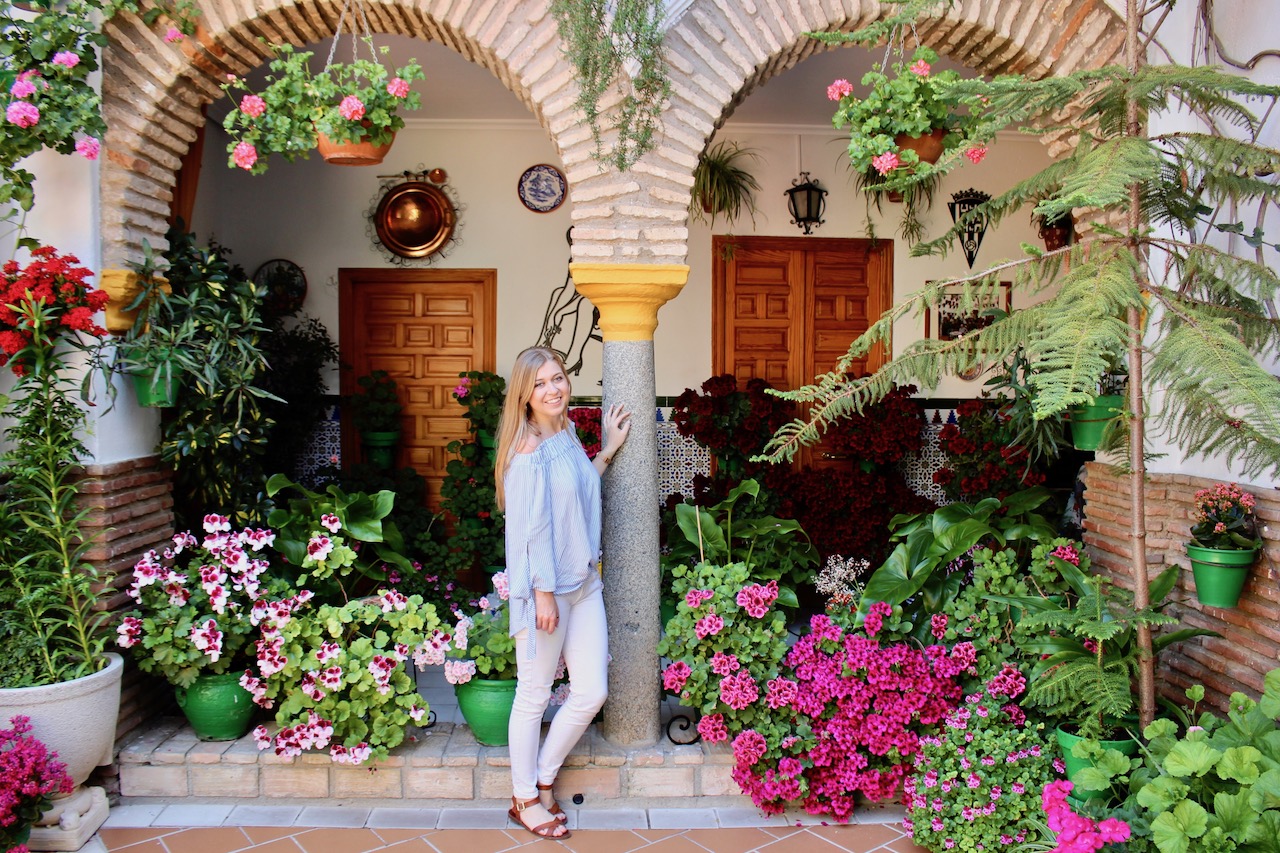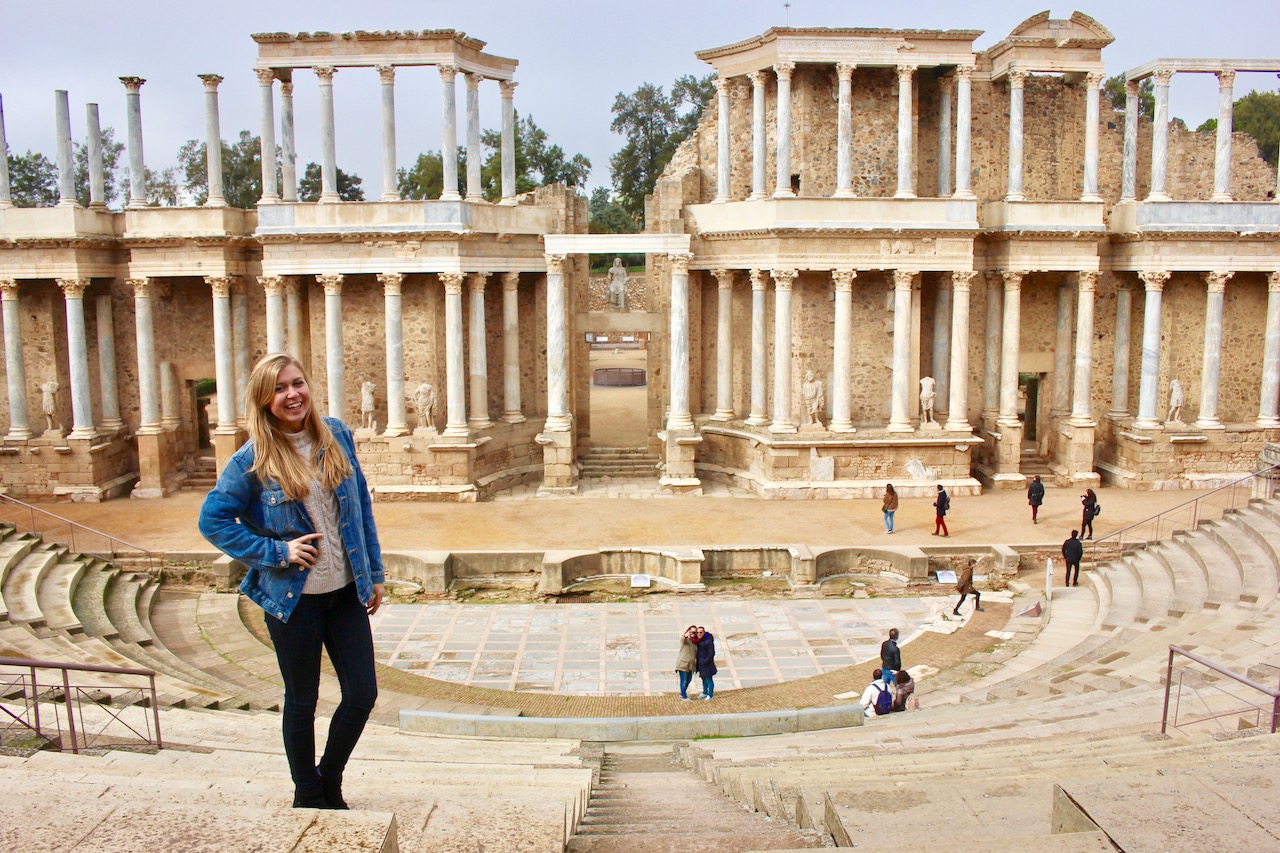15 Things You’ll Wish You Knew Before Becoming An Auxiliar de Conversación
After two years living in Spain and working as an Auxiliar de Conversación, it’s safe to say I’ve learned quite a bit about teaching English in Spain. When first applying, it can be difficult to truly understand what you’ve signed up for. I know when I first applied, I was drawn in by the appeal of only working 12 hours a week while having the opportunity to travel and work on my blog in my free time. That being said, there are some things that I wish I had been more clear about before my plane landed in Seville. To help you manage your expectations and fully understand what life as an aux is like, I’ve put together this list of 15 things I think all auxes should know before heading to Spain!
1. You’ll be teaching English

I know, I know, this one should be obvious. However, I’m embarrassed to admit that the “teaching English” part of the job was one of the last things I considered when applying to become an auxiliar de conversación. However, it is so important to understand that you’ll be spending a fair amount of time teaching, probably more than you’d anticipated. If you don’t like children (or high schoolers), hate public speaking, or have zero interest in teaching, this may not be the best job for you. Fortunately, though teaching has never been my ultimate career goal, it is something I’ve come to enjoy and have discovered I have a knack for. For other auxiliares who don’t particularly love teaching or children, the pros (living in Spain, traveling, practicing Spanish) outweigh the cons of the program. For others, they don’t. It’s up to you to decide that. However, I strongly encourage you to consider if teaching is for you before booking that flight to Spain!
2. You may not like your placement
Each year, a few thousand Auxiliares de Conversación are placed (seemingly at random) in schools throughout Spain. While many applicants wind up in their first choice region, others do not. Even if you end up in your first choice region, you may not be placed in your area of choice. While some first-year applicants luck out with an ideal placement in their dream city, others end up in tiny pueblos far from where they’d imagined they might be placed. (This isn’t to say everyone wants to be in a city, some auxiliares are looking for a pueblo experience.) Last year, I was placed in a town of around 30,000 people about 45-minutes outside of Seville. I chose to commute, but in the end, I wished I had saved myself hours of travel time and money and lived in the town I was placed in. I loved my school, made friends with the teachers, and with the money I spent commuting, I could have spent every weekend in Sevilla if I wanted to!

If you get a placement and are initially unexcited about it, consider if it close to any other cities, what the public transportation system might be like, and if you’re more interested in commuting or having more free time and staying in a city during the weekends. Try connecting with other auxiliares who have lived nearby on Facebook and hear their experiences. During the week, you are bound to be busier than you’d think, so spending weekends away might be just the trick to make lemonade out of lemons. You may be pleasantly surprised and love a placement you weren’t happy about, but also be prepared that you may not love it, so have some strategies ready to handle this, just in case.
3. You may (or may not) like your school
During my time as an auxiliar, I have been lucky and loved both my schools. The staff have been welcoming and friendly, I haven’t been overworked, the tasks expected of me were reasonable, and my schools were flexible if I was sick or couldn’t to school for some reason. That being said, this isn’t the case for everyone. Some people find that they spend too many hours preparing outside of school (a few hours are normal, but an overwhelming amount is not), while other auxes find that they aren’t doing anything in classes and wish to learn more about teaching. Some administrations are friendly and work with you to solve problems, others can be less helpful and somewhat problematic.

While there is no way to predict if you will love (or dislike) your school, it is best to go in with a positive attitude, be willing to learn, and understand that it’s okay to feel a little uncomfortable, at least at first. You’ll also want to be professional. Though you only teach 12 hours a week, you must respect that for the other teachers this is their full-time job. Show up on time, be prepared, and treat the job with the respect that you would any other. If issues arise, try speaking with your bilingual coordinator or seeing if any other auxiliares have faced similar struggles. You can also try contacting the former auxiliar to learn more about their experiences.
4. The Auxiliar de Conversación provides little to no help when settling in

You’ve been warned. The Auxiliar de Conversación program expects you to act independently and treats you as an adult. You’ll have to fill out paperwork, obtain a residency card, find an apartment, open a bank account, set up your phone, and more…all by yourself. Honestly, the first few weeks can be stressful trying to settle in (which is why you’ll want to arrive early), but I promise that’s the hardest part! While all of these processes aren’t exactly fun, I was able to do it with barely any Spanish (though more Spanish would have been a big plus). If you are unsure how to go about any of these steps, I found it helpful to link up with a fellow aux and tackle these appointments together. There are also tons of resources on the auxiliar Facebook page.
5. Strategically pick your region

I first visited Seville months before applying to become an auxiliar, so I knew I wanted Andalucia!
When deciding what your regional preference is, there are many things to take into account. Are you planning on traveling a lot when you get to Spain? Then make sure your region has an airport with cheap flights, or is centrally located in Spain. Are you hoping to improve your Spanish? Then you may not want to be in a region that speaks a local dialect like Pais Vasco, Catalunya, Galicia, or Valencia. Would you like to be near a beach? Is your region more rural, or is it packed with several main cities? Do you want to be near nature? Is weather a concern of yours? Do your research before choosing a region! I love the beach and was hoping to be placed near Seville, and was so happy to get my first choice region of Andalusia, where I have been teaching the last two years.
6. How much Spanish should you know?

Am I a local now? Feria de Sevilla
The more Spanish you know when arriving, the better. That being said, I arrived here knowing zero Spanish and have managed just fine, and have even learned a lot along the way. Some regions like Madrid have a higher English level overall than others. Cities typically have more English speakers than pueblos. Auxiliares de Conversación are placed in are bilingual, so at least some of the teachers will be able to communicate with you in English. However, I’ve found that some aren’t very confident in English, and therefore won’t speak it around you. When I first came to Spain, I was worried none of the teachers at my school would know English and that I’d only be able to talk with the English teacher, which clearly wasn’t the case. The more Spanish you know, the easier it will be to communicate with your landlord, Spanish roommates (if you have them), fill out your essential paperwork, and make friends. However, if you don’t know any Spanish, don’t panic-just be prepared to often be out of your comfort zone, and get practicing with Duolingo, intercambios (language exchange partners), or another Spanish learning resource!
7. The job isn’t “just 12 hours”
When I heard that the auxiliar program was only “12 hours” a week (16 in Madrid), I was SOLD. I mean, who wouldn’t love having all that free time? While it is true that the aux program is way less than a typical 40 hour work week, in reality, you’ll spend more time planning, commuting, at school, and/or working another job. Whiles auxes only work 4 days a week, there is no guarantee that your school will optimize your schedule. You may have multiple free periods in between classes where you are stuck sitting around. Fortunately, my schools limited my downtime on the job, but I do have a 30-minute recreo (recess) period where I am at school, but on break.

You also may find that you will spend time outside of class planning lessons. While I typically don’t have too much prep work, you should know that this is part of the job, and that some schools expect you to prepare more than others. Additionally, most auxiliares pick up a second job to help earn some extra €€€. These are typically in the evening after siesta, so your work day could potentially span from 9 AM-9 PM, with a break in between. If you include my commute and additional classes, I’m pretty much tied up over 30 hours a week. Which brings me to #6…
8. You’ll (probably) want a second job

While €700 (or €1,000 in Madrid) is technically enough to get by in Spain, if you plan on traveling, have student loans, or don’t want to live on a crazy tight budget, you’ll probably be in the market for a second job. Fortunately, it usually isn’t terribly difficult to find side work teaching English, which typically pays between €12-€15 an hour depending on where you’re living. The past two years, I have found jobs in language academies, the first in the pueblo where I worked, the second in Seville. I also know many auxiliares who teach private classes on the side (clases particulares), and have taught a few myself. These jobs can be found through your school or are sometimes passed down from past auxiliares, jobs are often posted in Facebook groups, and there are even websites like tusclasesparticolares where you can find private lessons. Some auxes opt to teach English online through websites like VIPKid.
Read more about my personal experiences living on an aux budget in this post: Auxiliar de Conversación Budget: Exactly How Much I Make (And Spend) Each Month In Spain.
9. Bring more money than you think

The Auxiliar de Conversación program has a reputation for not paying on time, so it is a great idea to come with enough cash to support yourself for 3 months. You’ll also want funds available in case of an emergency, for travel, and a flight home. You should also consider any start-up funds you may need for when you leave Spain. I highly recommend saving as much as possible before you arrive, that way you don’t feel limited, particularly when it comes to travel! While I had enough saved up to travel a ton my first year as an auxiliar, I didn’t factor in that I might want to stay a second year…
10. You may stay 2 (or more!) years

When I first arrived in Spain, I had no intention of staying to teach for 2 years. However, as January rolled around, I knew I’d at least apply to renew, and by June I was accepting a placement for my second year. Let’s face it-9 months goes surprisingly quickly! Many auxiliares end up staying at least one more year for these reasons-it’s easy to reapply, you’re finally settled in, and 2nd-year renewals get priority placement. Others fall in love with Spain (or a person in Spain), want to travel more, enjoy teaching, want to try a new region, the list goes on. Of all the auxiliar friends I met last year, nearly every single one of them reapplied, and most stayed a second year. I wish I had considered this possibility before coming-I would have stretched my funds more during my first year!
11. Set goals before you go

Festival of the Patios, Cordoba
Moving and adjusting to life and a new job in a foreign country can be stressful, or at the very least throw you off a bit, which is why I recommend outlining your goals before you move to Spain. Are you moving to learn Spanish? Become a teacher? Travel? Take a gap year before applying to grad programs? Whatever the reason, outline your goals clearly before moving to Spain, so they don’t get put on the backburner. You’ll also want to identify ways you can achieve these goals to make it easier to accomplish them once you arrive.
12. Get your medical affairs in order

Merida, Extremadura
Do you have any prescriptions you take? Any dental work you need done? Or another medical condition that you routinely take care of in the US? While you will get health insurance through the program, sometimes there may not be access to a particular prescription in Spain. Or, if you don’t speak much Spanish, things can be lost in translation. While there usually is an equivalent option to a specific prescription, they are not always exactly the same. The most common medical complaint I hear is from women auxiliares in regards to switching birth control pills or methods. If this is a concern for you, I highly recommend joining the Lady Auxiliares Facebook Group. I personally haven’t experienced any serious health issues during my time in Spain, and the 2 times I visited the doctor, I was able to communicate my health issue and was treated accordingly.
13. Take advantage of travel opportunities

San Sebastian, Pais Vasco
One of the best parts of getting to live in Spain is all of the travel opportunities you’ll have while living there! I highly recommend making a list of places you’d like to visit in Spain (and beyond) before you even leave for Spain. To save money on flights, you’ll want to book in advance, so be sure to familiarize yourself with your school’s holidays. Unfortunately, many of the school holidays correspond to national bank holidays, meaning that many people in Spain will be booking trips and flights for the same times as you. Don’t wait to make friends to book trips! It can be fun planning solo adventures. I often plan and book a trip in advance, and then invite others to join in if they can. This way I don’t get stuck paying extra if a friend isn’t ready to commit! During my time as an aux in Seville, I’ve visited Cadiz, Italica, Valencia, Merida, Cordoba, Nerja, Bilbao, San Sebastian, Pamplona, Portugal, Belgium, Germany, Denmark, Italy, Sweden, Malta, France, and more, all without dipping too much into savings!
14. Find the perfect piso

My apartment in Sevilla may be small, but it has an incredible view!
I’m going to let you in on a little secret, no piso (apartment) is perfect. For example, my piso has the world’s smallest hot water tank, but I like nearly everything else about it, especially the price, location, and fact that I only have 2 roommates. That being said, there are a few major things to watch out for when apartment hunting. Perhaps the most important is finding a reputable landlord. The auxiliar Facebook page is riddled with landlord horror stories. To help prevent getting a bad landlord, make sure to NEVER put a deposit down on an apartment before seeing it first. This will help you avoid scams and also let you get a feel for the type of person the landlord is. If there are already a couple of people living in the piso, ask how they feel about the landlord-are they fair? Do they return deposits on time? Any issues with the building or utilities? You’ll also want to consider roommates. Do you want to live with Spanish people? Would you feel more comfortable living with fellow auxes? Do you want English speakers in the house? I chose to live with fellow auxiliares my first year, which worked out perfectly as we were all experiencing the same things! Location and budget are equally important considerations. Are you close to your school? What is public transit like? Do you have a commute? Is the piso in your price range? How much are utilities? Keep in mind, utilities can be more expensive than you’d think!
15. Get out of your comfort zone!

Feria de Sevilla
The number 1 thing you can do to set yourself up for success in Spain is to be prepared to step out of your comfort zone…a lot! As an Auxiliar de Conversación, you’ll be doing a new job, in a new country, meeting new people, and speaking a different language. The more you can embrace change, the better! Don’t be afraid to put yourself out there. You will get out of the next year (or two or three) what you put into them. It may not always feel comfortable or easy, but the obstacles, changes, and challenges you overcome will surprise you. I’m amazed by how I’ve grown in just two years. I’ve traveled to over 25 cities in Spain and beyond, dramatically improved my Spanish, made new friends from around the world, learned about Spanish culture, become a budgeting queen, grown my long distance relationships with friends back home, and discovered that I’m a pretty good teacher. Just to name a few! While living and teaching in Spain isn’t always as glamorous as one would think, it’s an experience I’m so glad I’ve had!
Have you ever considered teaching English in Spain as an Auxiliar de Conversación? What do you think you’d gain from the experience? Let me know in the comments!
For more information on teaching English in Spain, check out all of my Auxiliar de Conversación posts!
You may also enjoy my monthly Auxiliar updates or these posts:
- Auxiliar de Conversación Budget: Exactly How Much I Make (And Spend) Each Month In Spain
- My First Day Teaching English In Spain As An Auxiliar de Conversación
- My First Month Teaching English In Spain As An Auxiliar de Conversación
Pin this post for later!





